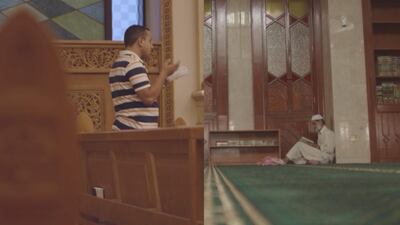An Abu Dhabi-made short documentary that has already captivated the Arabic press by focusing on what can be one of the world’s most corrosive and divisive issues – religion – makes its world premiere today at the Abu Dhabi Film Festival.
Daniel Malak made his short documentary One, which is part of the Emirates Film Competition's short-documentary section, as a direct response to the spike in religious conflict and ensuing violence and unrest in the Middle East.
His 16-minute film shows the UAE as a beacon of hope, where Muslim and Christian communities happily coexist side by side.
The film was the subject of stories in at least 14 Arabic newspapers in one day in the week leading up to its first screening. A Saudi newspaper declared it to be the most talked-about issue trending online in that country, when the film’s press release went viral. Malak has also been interviewed on CNN Arabia and Sky News Arabia. So far, without anyone having seen the film, he has found the reaction to be positive.
“They seem to love the idea, because this is exactly what we need right now,” he said. “Watching the news, there didn’t seem to be hope – just hate and bloodshed. Yes, it’s reality.
“But there’s also another reality. I feel strongly that the UAE is a great example of how people from different faiths in this region can live as one, and respect each other’s beliefs. The UAE’s leaders made sure to have churches built here and to give them what they needed.”
The film focuses on the common ground Christians and Muslims share, featuring interviews with Islamic and Christian community leaders, including the Islamic Studies expert Ahmed Al Mousa and Reverend Andrew Thompson of St Andrew’s Church in the capital.
“We’ve got to start by recognising what we have in common,” says Thompson. “Then from that position of friendship, we can begin to understand and accept one another in our differences.”
Ali Al Hashemi, the religious and judicial adviser at the Ministry of Presidential Affairs, who led the prayers at the funeral of Sheikh Zayed, offers one of the film’s most potent arguments: “A Muslim cannot be a Muslim unless he is Jewish and Christian first.”
Malak was given permission to film worshippers praying inside Sheikh Zayed Mosque and Mohammed Bin Zayed Mosque, and in the Abu Dhabi churches St Andrew’s and the neighbouring St Antony Coptic Orthodox Cathedral.
Malak, himself a Christian Egyptian-Palestinian, is a multimedia producer for Seven Media who has called Abu Dhabi home since he was 5. Malak refuses to align himself with just one interpretation of Christianity. At Easter and Christmas, he attends three churches: Evangelical, Catholic and Orthodox.
One scene of his film shows four-year-old footage of how the religious community rallied together after a bomb exploded in Alexandria, Egypt, in 2010, killing relatives of members of the capital’s Coptic Church.
“A lot of local Islamic dignitaries attended the Coptic Church in sympathy with Christians,” Thompson explains. “They were saying: ‘This hurts us as Muslims, as well as Christians.’
“With what’s happening in Iraq and Syria, the western media is full of the horrors of an extremist religion. There is a widespread level of tolerance in the UAE which confounds most people in the West.
“When they hear I’m a Christian leader here, their immediate assumption is that I work for a persecuted church. It’s my great pleasure to tell them that’s not the case. You can’t sweep the entire Middle East with the same brush. Part of our mission as a church is telling people ‘we are living in a Muslim country, and we love it’.”
Thompson is an expert in both Islam and Christianity – he has a degree in Islamic Studies and just released a paperback version of his book, Christianity in the UAE. His new book Jesus of Arabia, has been two years in the making and is due out next month.
“Jesus is considered one of the most important individuals in Islam,” says Thompson. “I’m trying to relate Jesus’s message to the culture of the Arabian Gulf, to make it more relevant and accessible and to reinforce links between people of the two faiths.”
In a symbolic gesture, the book includes a foreword written for him by the UAE Minister for Culture, Youth and Social Development, Sheikh Nahyan bin Mubarak Al Nahyan. “Uniting people of different faiths, finding common ground among those who come from different cultural traditions, harnessing the core values that are common to all religions,” writes Sheikh Nahyan. “These principles are consistent with the aims of the United Arab Emirates.”
One, Vox 3, Sunday, October 26, 6pm, and Saturday, November 1, 4.15pm

